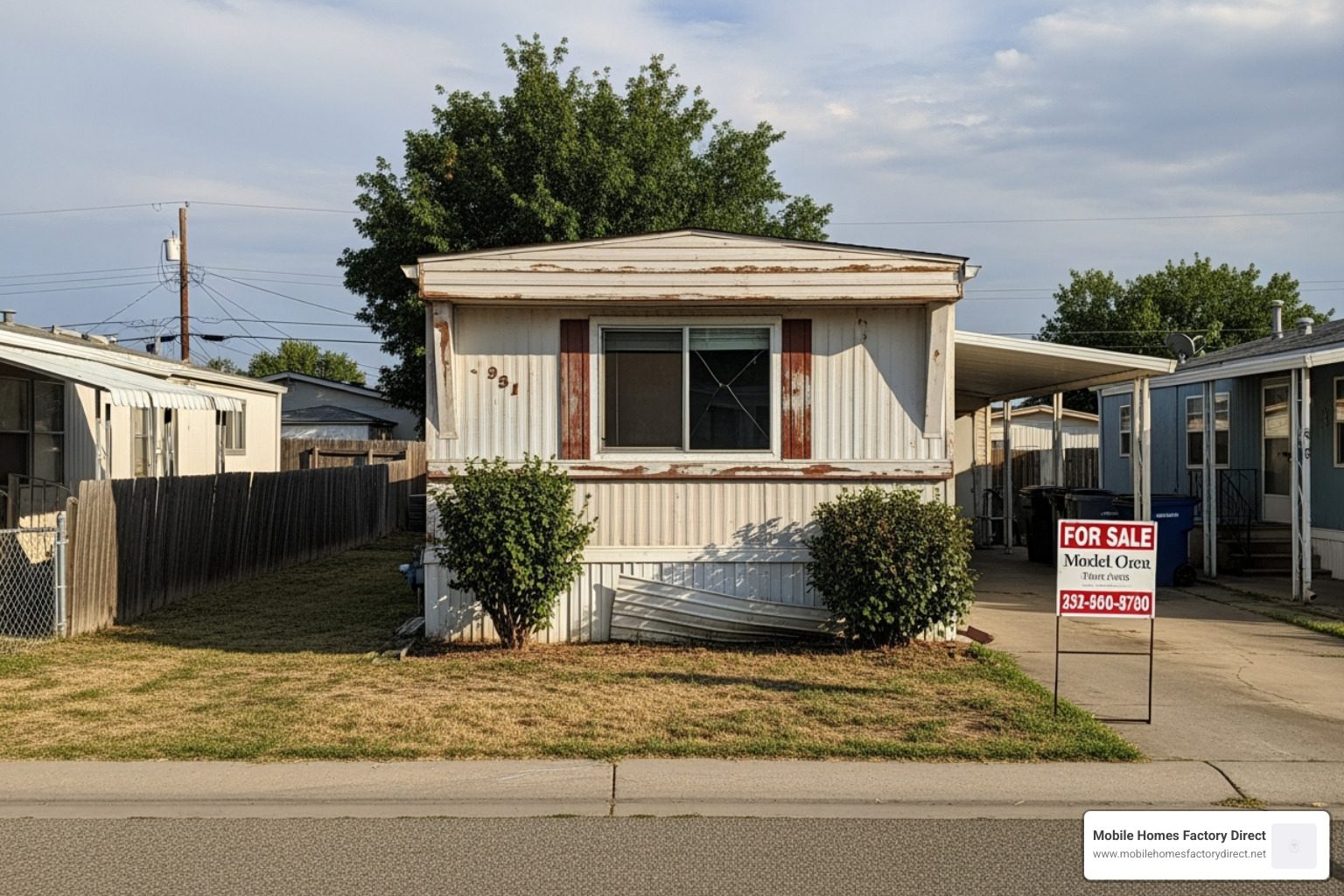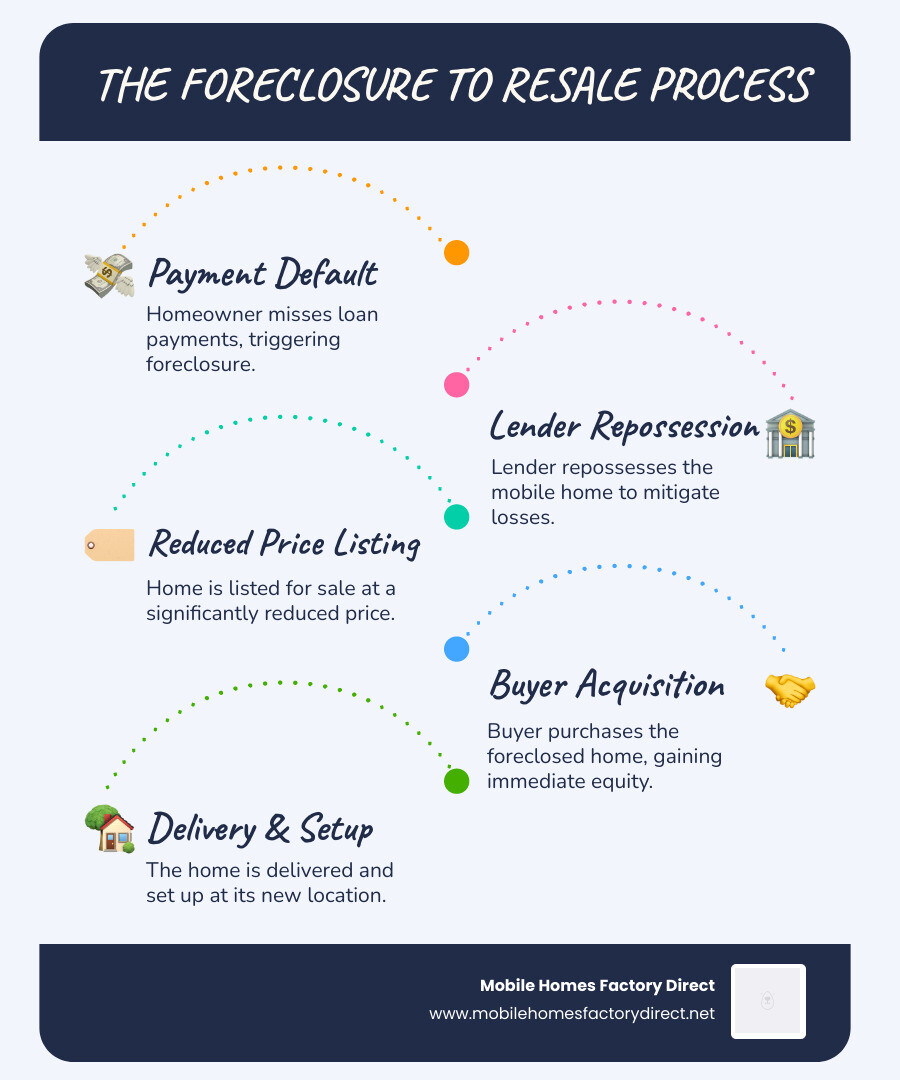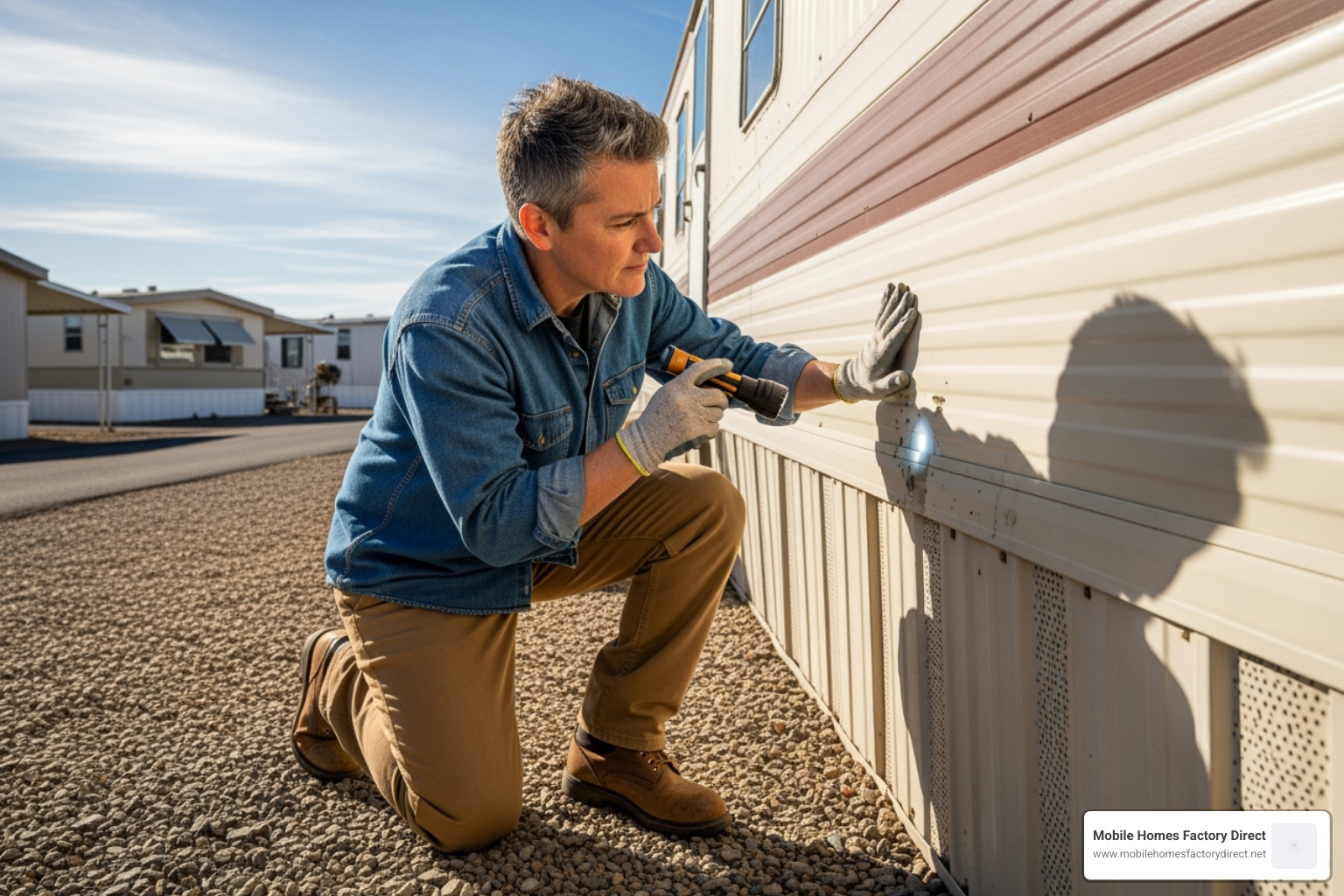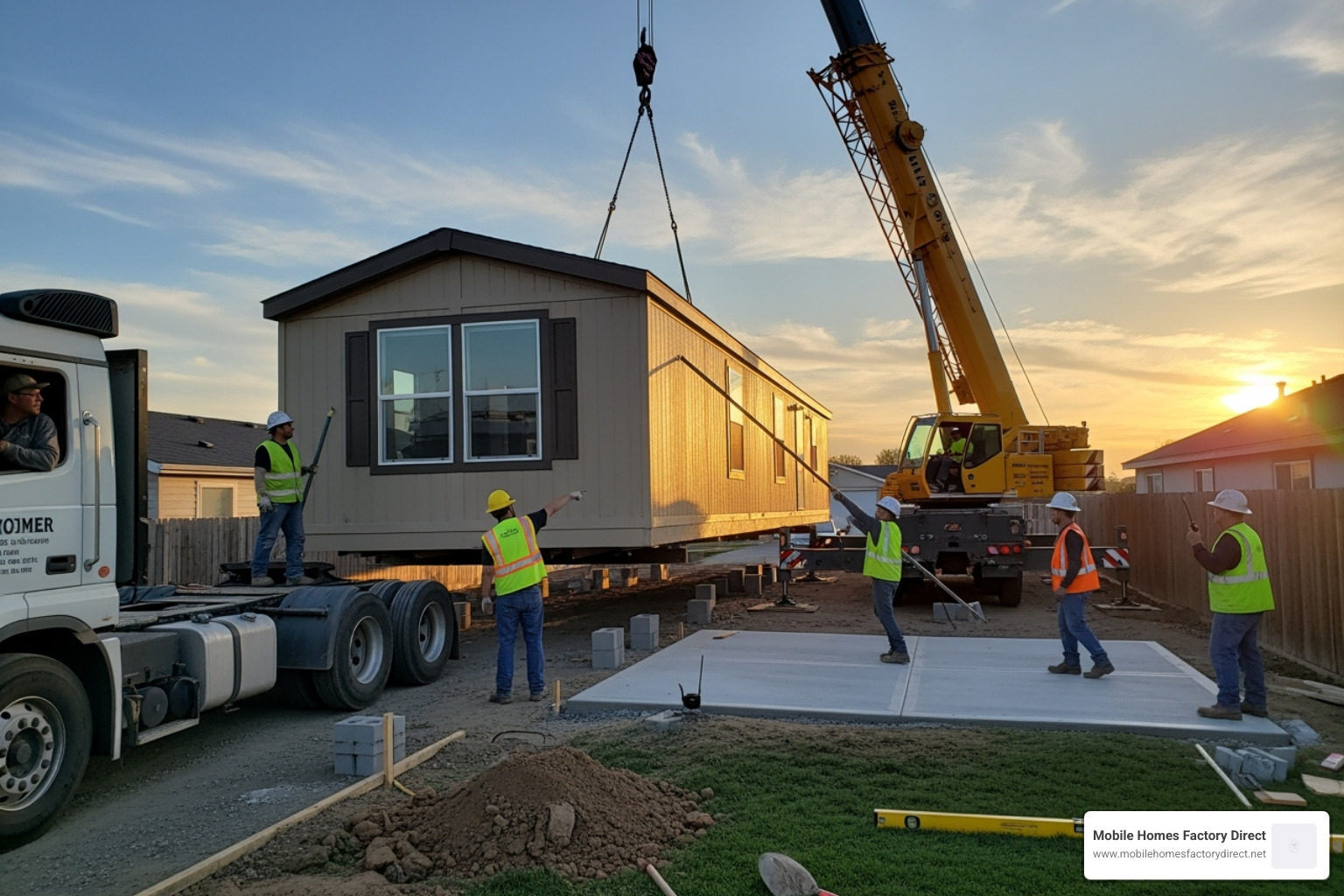Your Ultimate Guide to Finding Foreclosed Mobile Homes
Find affordable foreclosed mobile homes! Our guide covers pros, cons, buying process, financing, & FAQs for smart homeownership.
Why Foreclosed Mobile Homes Are Your Gateway to Affordable Homeownership
Foreclosed mobile homes are manufactured homes repossessed by lenders after owners default on their loans. These properties are then sold at significantly reduced prices, typically 20-40% below market value, making them an attractive option for budget-conscious homebuyers.
Quick Facts About Foreclosed Mobile Homes:
- Price Range: Usually $25,000-$60,000 (30-50% savings vs. new)
- Financing: Available with credit scores as low as 550
- Purchase Timeline: 4-8 weeks from application to closing
- Condition: Sold “as-is” but many are move-in ready
- Where to Find: Bank websites, specialized dealers, government agencies
When a homeowner falls behind on payments, the lender eventually repossesses the home and lists it for sale to recover their losses. This process creates unique opportunities for buyers seeking affordable housing solutions.
For families facing the affordable housing crisis, foreclosed mobile homes provide a practical pathway to homeownership. With immediate equity built-in from day one and financing available even for those with credit challenges, these properties deserve serious consideration.
The Pros and Cons of Buying Foreclosed Mobile Homes
Buying a foreclosed mobile home can be a fantastic deal, but understand both the benefits and potential drawbacks. While the savings are significant, these homes aren’t without their considerations.
Key Advantages of a Repo Home
Foreclosed mobile homes typically sell for 20-40% below market value, which can mean savings of $15,000 to $40,000 compared to buying new. This discount creates immediate equity—from the moment you buy, you own more value than you paid for.
Banks and lenders want these homes off their books quickly, which gives you negotiation leverage. We’ve seen buyers secure additional discounts because lenders were motivated to close deals fast. You may also face less competition compared to the market for new builds and traditional homes.
For even better value, consider Repo Mobile Homes With Land For Sale. Buying the land eliminates monthly lot rent (often $300-$800) and adds potential for land appreciation, turning your home into a stronger investment.
Here’s how repo purchases compare to buying new:
| Feature | Repo Mobile Home Purchase | New Mobile Home Purchase |
|---|---|---|
| Cost | 20-40% below market value; typically $25k-$60k | Higher initial cost; typically $50k-$150k+ |
| Condition | “As-is”; may require repairs | Brand new; usually no immediate repairs needed |
| Equity | Immediate 20-40% built-in equity | Equity builds over time |
| Competition | Potentially less fierce | Higher competition, especially for popular models |
| Negotiation | More leverage with motivated sellers | Less room for negotiation |
| Financing | Available with flexible options, even lower credit scores | Standard financing options |
| Timeline | 4-8 weeks | Can be longer due to manufacturing/delivery schedules |
Want to understand more about why repos make sense? Check out our detailed guide on Why Should You Get a Repo Mobile Home.
Potential Risks and How to Mitigate Them
Foreclosed mobile homes are sold “as-is,” meaning you get what you see—including hidden problems. Previous owners may have neglected maintenance.
The biggest concerns include hidden structural damage to floors, walls, roofing, or the chassis. Some repos have foundation problems from improper setup, while others might have non-obvious plumbing and electrical issues. Water damage is particularly sneaky; a small leak can cause major problems. Learning to spot signs of water damage is crucial.
You may also face location challenges, such as zoning restrictions or unexpected costs for utility access. Finally, be aware of potential title and lien issues left behind by previous owners.
Here’s how to protect yourself:
- Professional Inspections: This is non-negotiable. Spending $300-$500 on a thorough inspection can save you from thousands in surprise repairs.
- Title Insurance: Always get title insurance to protect against legal and financial claims from previous ownership.
These risks are manageable with due diligence. Smart buyers who do their homework often find incredible deals. For more guidance, explore our Repossessed Mobile Home Buying Tips.
The Process for Finding and Purchasing Foreclosed Mobile Homes
Finding and buying a foreclosed mobile home is a straightforward process when you know the steps. This section outlines the journey from your first search to closing the deal.
Where to Find Listings
The market for foreclosed mobile homes moves fast, so knowing where to look is a major advantage.
- Bank REO Sections: Banks list repossessed homes in their “Real Estate Owned” sections online. They are motivated sellers who often price homes aggressively.
- Specialized Dealers: Dealers like us at Mobile Homes Factory Direct often get access to inventory before it hits public listings. We serve families throughout Von Ormy, Somerset, San Antonio, and surrounding areas, offering local market expertise.
- Online Marketplaces: Websites like MHVillage.com allow you to filter specifically for repo or foreclosed homes and set up alerts for new listings.
- Government Agency Websites: HUD, VA, Fannie Mae, and Freddie Mac maintain listings of foreclosed properties financed through their programs.
- Public Auctions: County courthouse auctions can offer great deals, but they often require cash and quick decisions.
- Local Scouting: Driving through local areas or working with real estate agents who specialize in manufactured housing can uncover unlisted opportunities.
For a comprehensive guide, check out our resource on Find Repo Mobile Homes For Sale Near Me.
What to Look For During an Inspection
A thorough inspection is your best protection against costly surprises.
- Structural Integrity: Check for soft spots in the floors, which can indicate water damage. Look for cracks or bowing in walls and ceilings. Examine the roof for missing shingles or damage.
- Foundation and Chassis: Get underneath the home to inspect the frame for rust or damage. Ensure the blocking, leveling, and tie-downs are secure and meet local codes.
- Plumbing and Electrical: Test all faucets and toilets, and check for exposed wiring or flickering lights. Test the water heater and HVAC system, as these are expensive to replace.
- HUD Label and Data Plate: Locate the red HUD certification label on the exterior and the data plate inside (often in a closet). This information is essential for financing and insurance.
A professional inspector experienced with manufactured homes is worth the investment. Our Repossessed Mobile Home Buying Tips provide more detail on this step.
Making an Offer and Closing the Deal
Once you’ve found a home and completed your inspection, it’s time to make it yours.
- Submit a Written Offer: Present your proposed purchase price, contingencies, and closing date to the seller. Don’t be afraid to negotiate, as sellers are often motivated.
- Provide Earnest Money: An earnest money deposit (usually $500-$2,000) shows you’re a serious buyer and is applied toward your purchase at closing.
- Include Contingencies: An inspection contingency lets you back out or renegotiate if major issues are found. A financing contingency protects you if your loan falls through.
- Close the Deal: The closing timeline is typically 4-6 weeks for home-only loans and 6-8 weeks for purchases including land. Before closing, do a final walk-through. At closing, you’ll sign the final documents and get the keys.
For more information, visit our Bank Repos section.
Navigating the Financial and Legal Details
This section covers the crucial financial and legal steps, from securing a loan to understanding the full costs and paperwork involved in buying a foreclosed mobile home.
What Financing Options Are Available for Foreclosed Mobile Homes?
Financing for foreclosed mobile homes is more accessible than many people think. At Mobile Homes Factory Direct, we offer flexible financing for all credit types, including bad or no credit.
- Chattel Loans: These are the most common loans for mobile homes, treating the home as personal property. Terms are typically 15-20 years with interest rates from 5-15%. Down payments range from 5-20%, but some lenders offer up to 100% financing for qualified buyers.
- FHA Title I Loans: These government-insured loans can cover both the home and land, often with down payments as low as 3.5%. The home must be built after June 15, 1976, and typically needs to be on a permanent foundation.
- VA and USDA Loans: VA loans offer excellent terms for veterans, often with no down payment. USDA loans are ideal for homes in designated rural areas, also with low or no down payment options.
Most lenders prefer credit scores of 600+, but we work with scores as low as 550. Lenders also review your debt-to-income ratio (ideally below 43%) and require two years of stable income. For more on financing pre-owned homes, explore our Used Manufactured Housing For Sale page.
Understanding the Full Cost of Ownership
The purchase price is just the start. Budget for these additional expenses:
- Transportation & Site Prep: Delivery can cost $3-$7 per mile, plus pilot cars if needed. Site prep, including land clearing and a foundation pad, can run $2,500-$7,000.
- Setup & Installation: This includes blocking and leveling ($1,000-$3,000), anchoring ($750-$1,500), skirting ($1,000-$3,000), and steps/porches ($500-$2,000).
- Utility Hookups: Connecting water, sewer, electricity, and gas typically costs $1,000-$3,000, plus permits.
- Ongoing Costs: Budget for homeowner’s insurance ($600-$1,200 annually) and property taxes.
- Repair Budget: Since homes are sold “as-is,” set aside 5-15% of the purchase price for initial repairs and updates.
- Closing Fees: These include origination, title, and appraisal fees. Most can be financed into the loan, except for the appraisal fee.
Legal Paperwork and Converting to Real Property
Understanding the legal details protects your investment. A title search is essential to verify the seller’s right to sell and uncover any liens. For manufactured homes, this includes a UCC filing search. The bill of sale is the document that formally transfers ownership to you.
A key consideration is whether the home is classified as personal or real property. Converting to real property can provide better financing terms and appreciation potential. This process typically involves installing a permanent foundation, removing the tongue and axles, and surrendering the vehicle title to the state. About 75% of states have laws allowing this conversion.
This classification affects how the home is financed, taxed, and handled in a foreclosure. Real property follows state real estate laws, which offer more homeowner protections. For more legal details, review Manufactured Home Foreclosures & Repossessions.
Know Your Rights: Facing a Mobile Home Foreclosure
While our focus is on helping buyers, it’s important to understand the foreclosure process from the homeowner’s perspective.
The process differs based on the home’s classification. If it’s personal property (like a vehicle), lenders can repossess it relatively quickly. If it’s been converted to real property, it falls under state real estate foreclosure laws, which offer more protections and a longer timeline. This distinction is crucial, as it affects your rights and the time you have to respond.
Loss mitigation options exist to help homeowners avoid foreclosure:
- Forbearance Plans: Lenders may temporarily reduce or suspend payments for a few months to help you through a short-term financial hardship.
- Loan Modifications: This permanently changes your loan terms, such as lowering the interest rate or extending the term, to make payments more affordable.
- Deed in Lieu of Foreclosure: You can voluntarily transfer ownership to the lender to avoid the foreclosure process, which is typically less damaging to your credit.
If you are facing foreclosure, seeking assistance early is critical. HUD-approved housing counselors provide free, expert advice and can help you negotiate with your lender. You can find a local counselor through HUD’s housing counselor directory.
At Mobile Homes Factory Direct, we understand that life happens. That’s why we’re passionate about making quality foreclosed mobile homes available to families seeking affordable homeownership.
Frequently Asked Questions about Foreclosed Mobile Homes
Here are answers to some of the most common questions we hear about buying foreclosed mobile homes.
Can I get a loan for a foreclosed mobile home with bad credit?
Yes, you can. While many traditional lenders require high credit scores, we specialize in flexible financing. We work with credit scores as low as 550 because we believe everyone deserves a chance at homeownership. We look at your complete financial picture, including stable income (typically two years) and a reasonable debt-to-income ratio. Some programs even offer up to 100% financing, minimizing your down payment.
Are repo mobile homes sold with land?
Sometimes, but not always. It depends on the original loan. If the previous owner financed the home and land together, you can find repo packages that include both. These are great deals as they eliminate lot rent and allow you to build equity in the land. However, many foreclosed mobile homes are sold as “home-only.” In that case, you can place the home on land you own, buy a separate lot, or move it to a mobile home community. The type of sale affects financing, so it’s important to know what you’re buying. Learn more in our Repossessed Double Wide Homes Complete Guide.
How long does it take to buy a foreclosed mobile home?
The process is typically much faster than traditional home buying.
- Home-only purchases usually take 4-6 weeks from application to closing.
- Purchases including land take slightly longer, around 6-8 weeks, due to the additional title work and appraisals required for the property.
The exact timeline can vary by lender and state, but you could be in your new home in about a month.
Your Path to Affordable Homeownership
We hope this guide has shown you the incredible opportunities that foreclosed mobile homes present. For many families, they are the key to achieving homeownership in a challenging market.
Purchasing a foreclosed mobile home at 20-40% below market value means you’re not just saving money—you’re making a smart investment with immediate equity built in from day one.
Success in this journey requires due diligence. A thorough inspection is absolutely key to avoid or negotiate potential repairs. It’s also crucial to understand all costs beyond the purchase price, including transportation, setup, and utility connections. Planning for these expenses upfront ensures a smooth process.
Even if your credit isn’t perfect, flexible financing options are available. We’ve helped families with credit scores as low as 550 become homeowners.
At Mobile Homes Factory Direct, we are your partners in making homeownership affordable. We’ve helped countless families in Von Ormy, TX, and surrounding communities like Somerset, Atascosa, and San Antonio find their perfect home. Our commitment is to provide the best homes at the best prices with a simple process and flexible financing for all credit types.
Ready to take the next step? We invite you to explore our available pre-owned homes. Your dream of affordable homeownership might be closer than you think.





